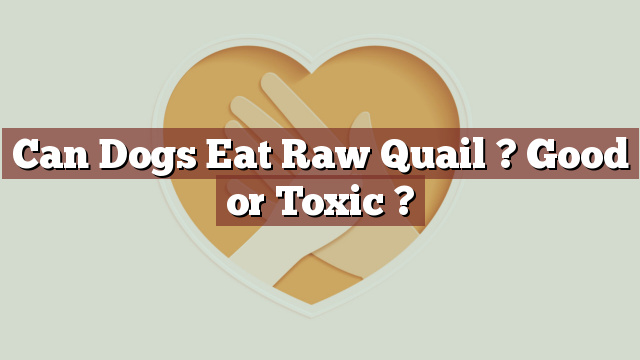Can Dogs Eat Raw Quail? Good or Toxic?
Knowing what foods are safe for our beloved canine companions is of utmost importance to ensure their well-being and overall health. Among the many questions that arise when it comes to feeding our dogs, one frequently asked query is whether dogs can safely consume raw quail. In this article, we will explore the nutritional value of quail, discuss whether dogs can eat raw quail safely or if it is toxic for them, examine the potential risks or benefits of feeding dogs raw quail, and provide guidance on what to do if your dog happens to consume raw quail.
Nutritional Value of Quail: What Does it Offer to Dogs?
Quail, a small game bird, is known for its rich nutritional content. This delectable fowl is packed with essential nutrients that can provide numerous health benefits to our furry friends. Quail meat is a great source of high-quality protein, which plays a crucial role in building and repairing tissues, supporting muscle development, and maintaining a strong immune system in dogs. Additionally, quail is rich in minerals such as iron, phosphorus, and selenium, which contribute to the overall well-being of our canine companions.
Can Dogs Eat Raw Quail Safely or is it Toxic for Them?
Dogs can indeed eat raw quail safely. Canine digestive systems are adapted to handle raw foods, and many dogs thrive on a raw diet that includes a variety of meats. However, it is essential to note that not all dogs may tolerate raw quail or other raw foods equally. Some dogs may have sensitivities or allergies to certain proteins, including quail, which can lead to digestive upset or other adverse reactions. Therefore, it is crucial to introduce any new food gradually and monitor your dog for any signs of discomfort or negative reactions.
Potential Risks or Benefits of Feeding Dogs Raw Quail
Feeding dogs raw quail can offer several potential benefits. As mentioned earlier, quail is a rich source of protein and minerals, contributing to a well-balanced and nutritious diet for dogs. Additionally, a raw diet can promote healthy skin and coat, improve digestion, and increase energy levels in some dogs. However, it is important to be aware that raw foods, including quail, carry a risk of bacterial contamination such as Salmonella or E. coli. These pathogens can pose a health risk not only to dogs but also to humans. Practicing proper food handling and ensuring the freshness and quality of the raw quail is crucial to minimize these risks.
What to Do if Your Dog Eats Raw Quail: Steps to Take
If your dog consumes raw quail, there are a few steps you should take. Firstly, assess your dog’s condition and monitor for any immediate signs of distress. If your dog shows symptoms such as vomiting, diarrhea, or excessive lethargy, it is important to seek veterinary attention promptly. Remember to provide your vet with detailed information about the quantity of quail consumed and the time it was ingested. In less severe cases, where your dog appears to be in good health, it is still advisable to consult with your veterinarian for further guidance and monitoring.
Conclusion: Making an Informed Decision about Feeding Dogs Raw Quail
In conclusion, raw quail can be a safe and nutritious addition to a dog’s diet. Its high protein content and mineral composition can provide health benefits to our canine companions. However, it is crucial to introduce any new food gradually, monitor for adverse reactions, and practice proper food handling to minimize the risk of bacterial contamination. If you have any concerns or questions about feeding raw quail to your dog, it is always recommended to consult with a veterinarian who can provide personalized advice based on your dog’s specific needs and health conditions. By making informed decisions and prioritizing our dog’s well-being, we can ensure that their dietary choices support their overall health and longevity.
Thank you for investing your time in exploring [page_title] on Can-Eat.org. Our goal is to provide readers like you with thorough and reliable information about various dietary topics. Each article, including [page_title], stems from diligent research and a passion for understanding the nuances of our food choices. We believe that knowledge is a vital step towards making informed and healthy decisions. However, while "[page_title]" sheds light on its specific topic, it's crucial to remember that everyone's body reacts differently to foods and dietary changes. What might be beneficial for one person could have different effects on another. Before you consider integrating suggestions or insights from "[page_title]" into your diet, it's always wise to consult with a nutritionist or healthcare professional. Their specialized knowledge ensures that you're making choices best suited to your individual health needs. As you navigate [page_title], be mindful of potential allergies, intolerances, or unique dietary requirements you may have. No singular article can capture the vast diversity of human health, and individualized guidance is invaluable. The content provided in [page_title] serves as a general guide. It is not, by any means, a substitute for personalized medical or nutritional advice. Your health should always be the top priority, and professional guidance is the best path forward. In your journey towards a balanced and nutritious lifestyle, we hope that [page_title] serves as a helpful stepping stone. Remember, informed decisions lead to healthier outcomes. Thank you for trusting Can-Eat.org. Continue exploring, learning, and prioritizing your health. Cheers to a well-informed and healthier future!

